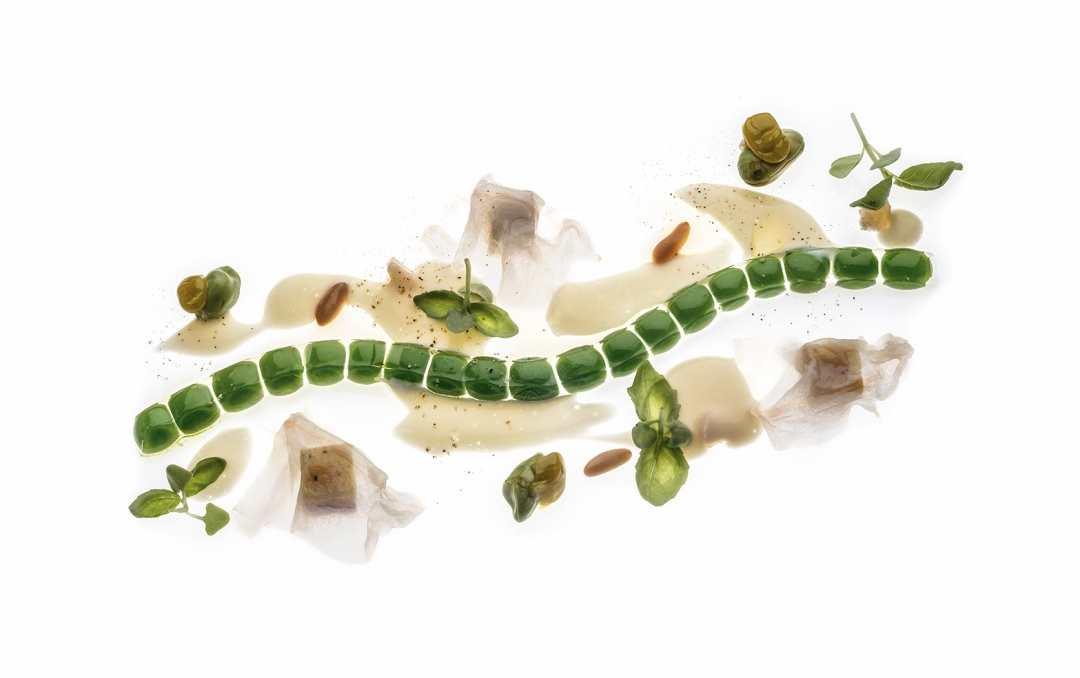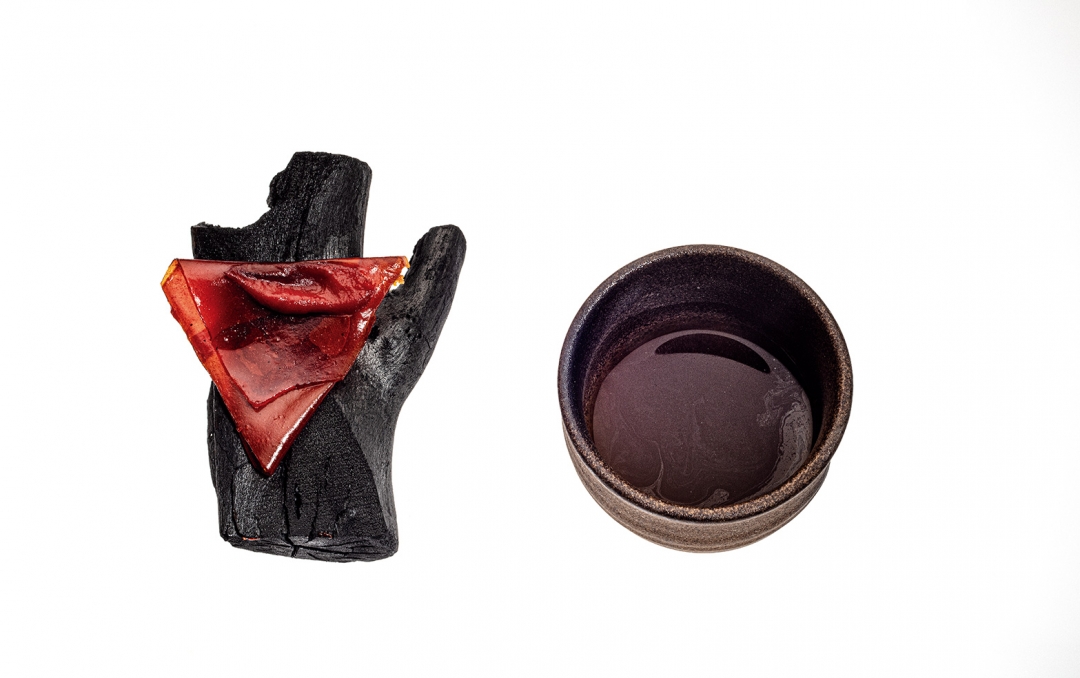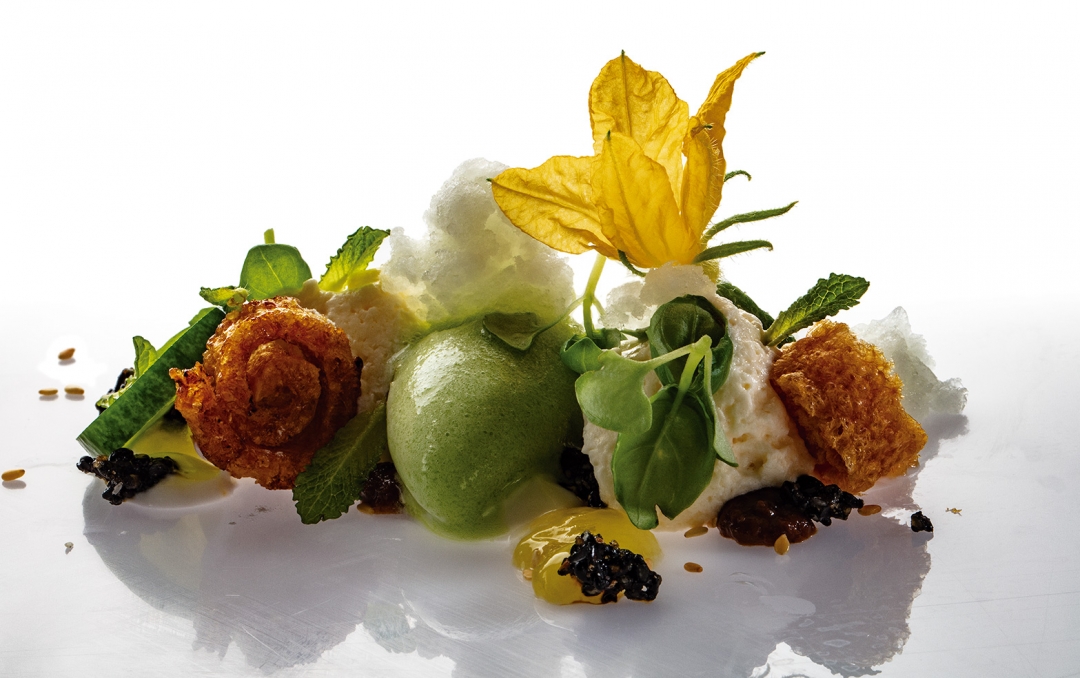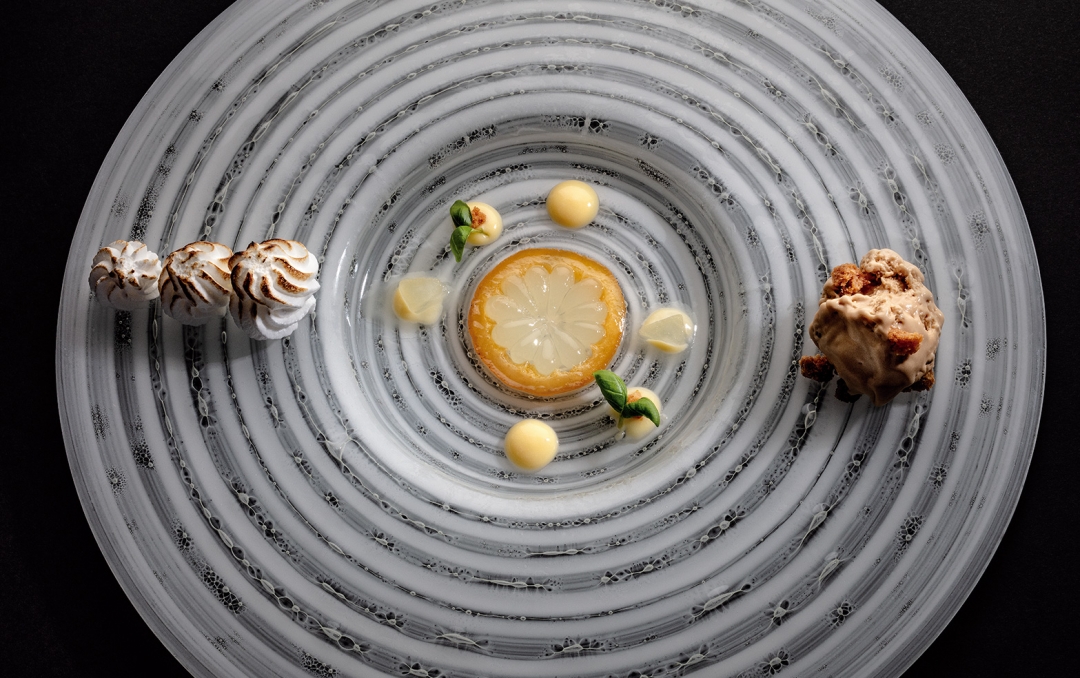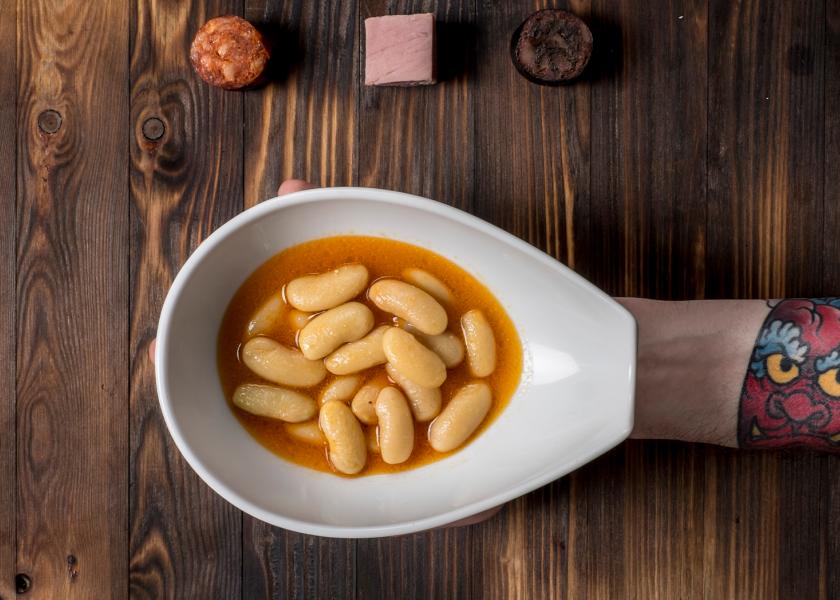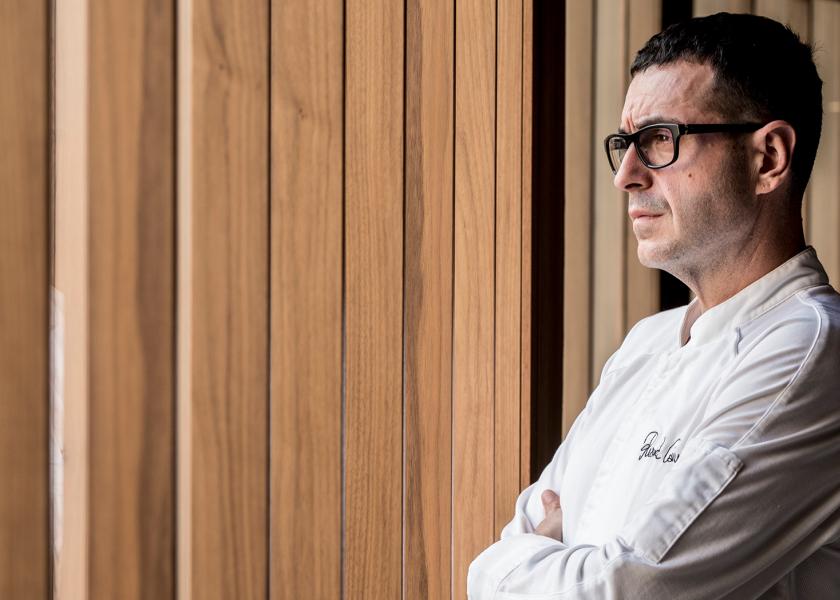Disfrutar
Six-Handed Avant Garde Cuisine
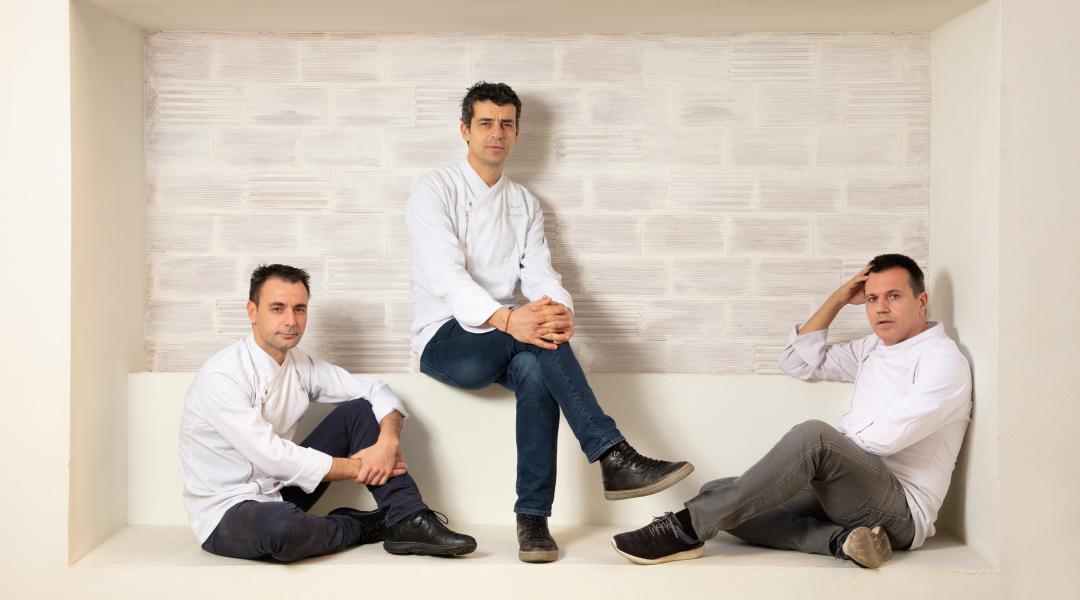
It is among the world’s ten best restaurants and boasts two Michelin stars. Many consider it as the heir apparent of El Bulli. This comment inevitably comes up every time people talk about Disfrutar, the project run by Oriol Castro, Eduard Xatruch and Mateu Casañas that masters cutting-edge gastronomic techniques.
Monday, 5pm. The last tables are about to leave Disfrutar. Located in Barcelona’s Eixample district, it was one of the first restaurants in Spain —the third according to the chefs— that dared to close on weekends. Not all customers liked the idea but, in turn, it increases the staff’s quality of life by a great deal. Three years having a full restaurant on weekdays, it is clear that their vision made sense. Many of high gastronomy’s classic ideas are being challenged by Oriol Castro, Eduard Xatruch and Mateu Casañas.
The tasting menu at Disfrutar is made up of 20 dishes, creating an unmissable gastronomical experience in Spain today. Creativity and method are clearly the main pillars of the cuisine of the three last head chefs at El Bulli. Their creation process starts with an idea they envision at the I+D lab within the restaurant —where they work with the same tableware in which food is served and eaten. That idea expands as they develop it and introduce it in different dishes — the classic trial and error method applied to the kitchen. “It may take a day, four months, five years or forever,” says Castro. Their minds, however, are always boiling with ideas. “We have a Whatsapp group to talk about work and a Dropbox to upload different ideas.” But it’s not all about innovation: “This is a place where there is clearly a high degree of creativity, but also a lot of tradition and produce,” he points out. No wonder a few years ago they took home the Best European Restaurant Award given by the prestigious dining survey Opinion About Dining (OAD).
The menu features specialties such as pesto-filled transparent pesto, smoked Idiazabal biscuit with apple, crispy egg yolk with mushroom jelly, marinated mackerel and cauliflower in vinegar, and pork jowl on red mullet with aubergine gnocchi. Among their new techniques are the creation of vegetable oils (from tomato or basil) and flour-free, obulato-based cocas. They concoct a minimum of seventy new dishes a year. “We grew up in El Bulli. Ferran Adrià was the image, and behind that image there was a great team. We worked together for 18 years and, when we left, we decided to launch a new project, and we believed that the most important of all was the team, the people,” says Oriol Castro.
Possibly this disposition — “the ego is useless,” he insists — is what allows this trio to work seamlessly, without any of them seeking to stand out as the soloist of the group. “Being three is better. Two people may get cross, but three makes things more balanced. That doesn’t mean we vote on everything; we just talk things through until we find a solution. It takes a little longer, but it's working very well,” says Castro. In fact, doing something separately is not among their plans. “We lived a lot together at El Bulli, so before setting up this restaurant we already knew each other well and knew it would work,” says Eduard Xatruch.
Today, they are also running Compartir, a restaurant in Cadaqués they launched in 2012, three years before Disfrutar. These days, it has fallen on Casañas to be at the helm in the kitchen of this more informal restaurant focused on snacks, between avant-garde and tradition, and with an appetizing rice menu.
More Than the Heirs of El Bulli
Legend has it coming to Barcelona did not happen until Adrià gave them his blessing, which they deny with the face of someone who has heard this before. “When there are no investment partners, the sacrifice is yours, so you think about things twice,” says Oriol Castro referring to the years they waited until they landed in Barcelona. “We have been doing well from day one and have been very lucky, perhaps because we have always opted for quality and for making customers happy. When we opened Disfrutar we had thirty payrolls and one month before the opening we didn't have a single reservation!”, they remember.
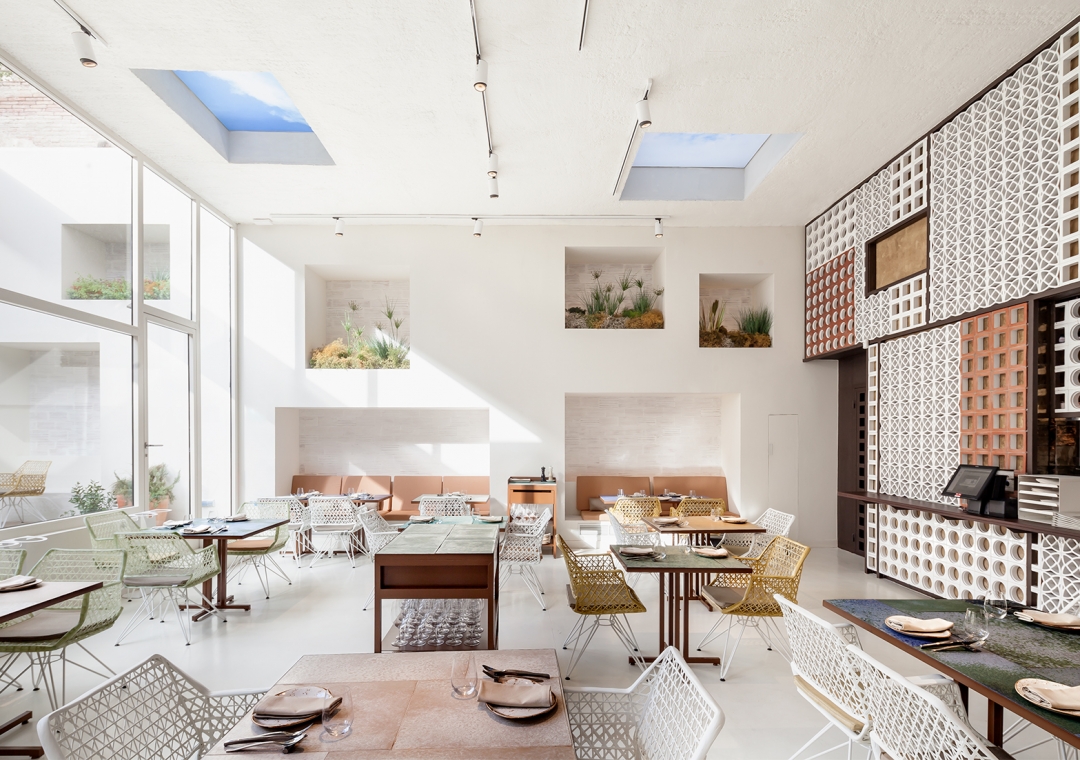
The space of the restaurant Disfrutar. © Adrià Goula
We all know that comparisons are odious, but what happens when the restaurant you are being compared to is a temple of haute cuisine such as El Bulli? “We carry the DNA and the spirit of El Bulli, but this is our kitchen. We brought with us the philosophy and the creativity, the understanding that the dining room is of the utmost importance, and a way of working, but we have been adapting and improving our style. We follow our own methodology for cooking and training people,” they explain.
Now they have a total sixty payrolls, which means that there is almost one staffer per customer. However, they guarantee their business, which also includes a new banquet line, is profitable. “If it weren’t, we wouldn't be here; but, still, it’s a very complex business," they admit. And the third Michelin star? “That would be thrilling, but what really concern us in our daily lives are our customers. We have never worked for Michelin”, says Xatruch. “We put a lot of pressure on ourselves to make sure our customers are happy when leaving the restaurant and want to return,” adds Castro.
"A third Michelin star would be thrilling, but what really concern us in our daily lives are our customers. We have never worked for Michelin"
Castro, Xatruch and Casañas are among the few chefs who still today take the stage to showcase new techniques. So much so that many in the sector haven’t shied away from copying some of them. “Our techniques are taught in some cooking schools, but they don't tell students who conceived them. Then they come here and say: ‘Wow, this is something I’ve been taught at school!”, they say laughing. They know cooking copyrights aren’t rewarded enough: “Few people care if the dish is an original or not when they come here,” says Eduard. “And we can’t say that, because it is the original, it’s 100 euros more expensive, as it happens, for example, in the world of fashion.”
